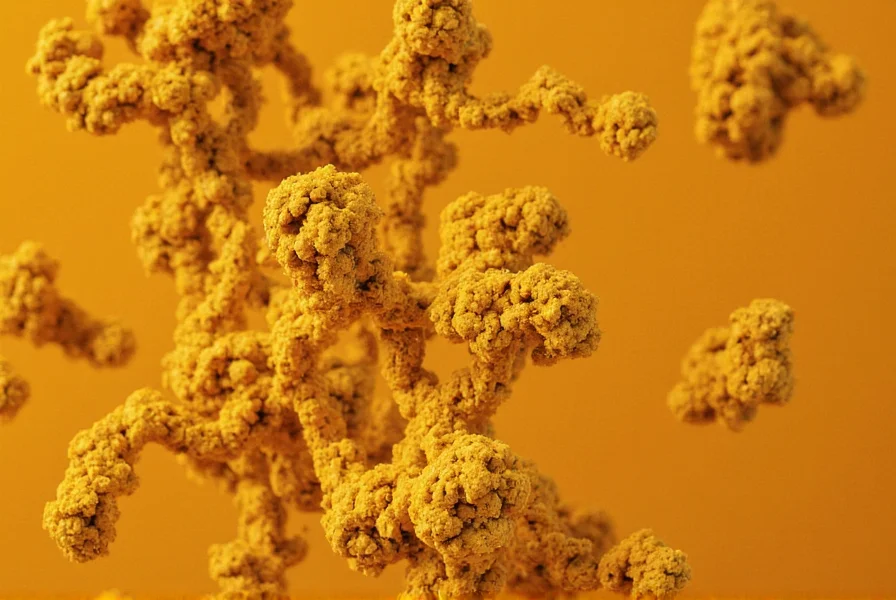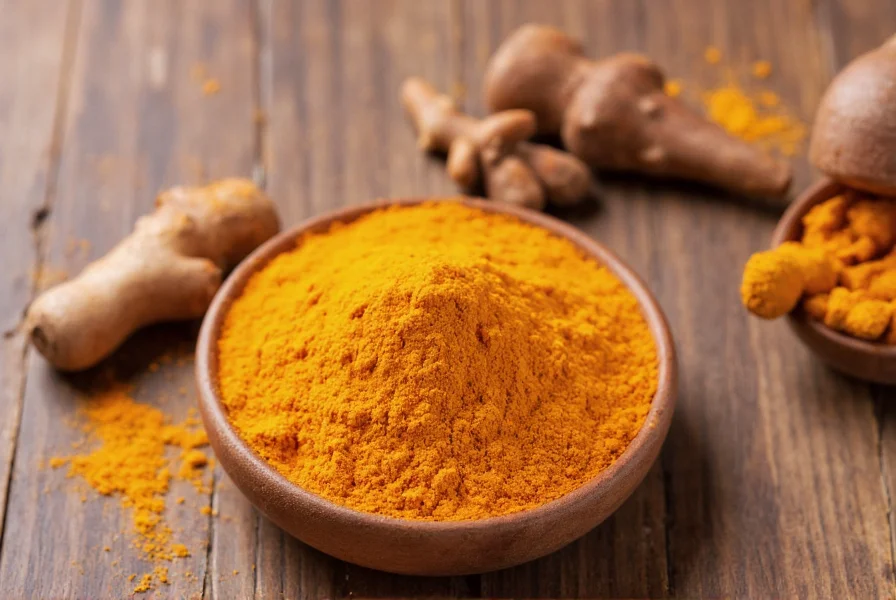Curcumin, the active compound in turmeric, has emerged as one of the most extensively studied natural anti-inflammatory agents. Modern research reveals its potential to modulate multiple inflammatory pathways at the molecular level, offering a promising alternative for those seeking relief from chronic inflammation without pharmaceutical side effects.
The Science Behind Turmeric's Anti-Inflammatory Properties
Turmeric (Curcuma longa) contains curcuminoids, with curcumin being the most biologically active component. Scientific studies demonstrate that curcumin inhibits key inflammatory molecules including NF-kB, cytokines, and enzymes like COX-2 and LOX. Unlike non-steroidal anti-inflammatory drugs (NSAIDs) that target single pathways, curcumin's multi-target approach addresses inflammation from multiple angles.
A comprehensive 2022 meta-analysis published in Nutrients reviewed 37 clinical trials involving over 3,000 participants. The analysis concluded that standardized curcumin extracts significantly reduced C-reactive protein (CRP) levels—a key inflammation marker—by an average of 20-30% compared to placebo. The most substantial improvements appeared in individuals with metabolic syndrome, arthritis, and other chronic inflammatory conditions.

Effective Dosage and Formulation Considerations
Not all turmeric supplements deliver equal benefits. Research indicates three critical factors determine efficacy:
| Formulation Type | Average Bioavailability | Recommended Daily Dose | Time to Notice Effects |
|---|---|---|---|
| Standard turmeric powder | 1% | 3,000-8,000 mg | Rarely effective |
| Curcumin extract (95%) | 1-5% | 1,000-1,500 mg | 8-12 weeks |
| Curcumin with piperine | 20x standard | 500-750 mg | 4-8 weeks |
| Liposomal or nanoparticle | 40-60x standard | 250-500 mg | 2-6 weeks |
The most effective turmeric supplements for inflammation contain either piperine (typically 5-10 mg per dose) or utilize advanced delivery systems like phospholipid complexes or nanoparticles. Without these enhancements, curcumin's poor bioavailability renders standard turmeric powder largely ineffective for systemic inflammation.
Clinical Evidence for Specific Conditions
Research shows particularly promising results for:
- Osteoarthritis: A 2021 study in Arthritis & Rheumatology found 1,000 mg of curcumin with piperine daily reduced pain scores by 47% after 12 weeks—comparable to 1,200 mg of ibuprofen—but without gastrointestinal side effects.
- Rheumatoid arthritis: Research published in Phytotherapy Research demonstrated that 500 mg of enhanced curcumin twice daily significantly reduced disease activity scores and inflammatory markers.
- Metabolic inflammation: Studies show curcumin supplementation improves insulin sensitivity and reduces inflammatory markers in individuals with type 2 diabetes and metabolic syndrome.
Safety Profile and Potential Interactions
Turmeric supplements demonstrate an excellent safety profile at recommended doses. The most common side effects are mild gastrointestinal discomfort at doses exceeding 1,500 mg daily. However, important considerations include:
- Curcumin may enhance the effects of blood thinners like warfarin
- High doses might interfere with certain chemotherapy drugs
- Individuals with gallbladder issues should consult a physician before use
- Pregnant women should avoid therapeutic doses
The European Food Safety Authority established an acceptable daily intake of 0-3 mg per kilogram of body weight for curcumin, translating to approximately 200-250 mg for most adults. However, clinical studies using enhanced formulations have safely employed doses up to 1,500 mg daily for extended periods.
Realistic Expectations for Inflammation Relief
Understanding how long turmeric takes to reduce inflammation is crucial for setting realistic expectations. Unlike NSAIDs that provide rapid but temporary relief, curcumin works through gradual modulation of inflammatory pathways. Most clinical trials report measurable improvements after 4-6 weeks, with optimal results appearing at 8-12 weeks of consistent use.
When evaluating does turmeric really help with inflammation, research suggests it works best as part of a comprehensive approach including:
- Consistent daily dosing (split into 2-3 doses for better absorption)
- Combination with healthy dietary patterns like Mediterranean diet
- Regular physical activity appropriate for your condition
- Adequate sleep and stress management
Choosing the Right Supplement
With countless options available, selecting the best turmeric supplement for inflammation requires attention to:
- Curcumin concentration: Look for standardized extracts containing 95% curcuminoids
- Bioavailability enhancers: Piperine (black pepper extract) or advanced delivery systems
- Third-party testing: Certifications from NSF, USP, or ConsumerLab ensure product quality
- Dosage transparency: Clear labeling of actual curcumin content per serving
Be wary of products listing "turmeric root powder" as the primary ingredient without standardized curcumin content—these typically contain only 2-5% curcumin and require impractical doses to achieve therapeutic effects.
Limitations of Current Research
While promising, turmeric research has limitations. Many studies use small sample sizes or short durations. The optimal turmeric supplement dosage for inflammation varies between individuals based on factors like:
- Body weight and composition
- Severity and type of inflammation
- Genetic variations in metabolism
- Concurrent medications and health conditions
Researchers continue investigating personalized approaches to determine who benefits most from curcumin therapy. Current evidence supports its use as a complementary approach rather than a complete replacement for conventional treatments in moderate to severe inflammatory conditions.
Practical Implementation Guide
For those considering turmeric supplementation, follow this evidence-based protocol:
- Start with 500 mg of curcumin with piperine once daily for one week
- After one week, increase to 500 mg twice daily
- Take with food containing healthy fats to enhance absorption
- Maintain consistent daily use for at least 8 weeks before evaluating effectiveness
- Track symptoms using a journal to objectively assess changes
- Consult your healthcare provider if taking medications or managing chronic conditions
Remember that individual responses vary significantly. Some people experience noticeable improvements within weeks, while others may require higher doses or find minimal benefit. This variability explains why understanding how much turmeric should I take for inflammation requires personalized consideration rather than a one-size-fits-all approach.
Conclusion
Turmeric supplements represent a scientifically supported option for managing inflammation, particularly when using enhanced formulations at appropriate doses. While not a miracle cure, consistent use of quality curcumin products can provide meaningful relief for many individuals seeking natural alternatives to conventional anti-inflammatory medications. As research continues to evolve, we're gaining better understanding of who benefits most and how to optimize turmeric's therapeutic potential for inflammation management.
How long does it take for turmeric supplements to reduce inflammation?
Most clinical studies show measurable reductions in inflammation markers after 4-6 weeks of consistent use, with optimal results typically appearing at 8-12 weeks. Individual response times vary based on the formulation used, dosage, and the specific inflammatory condition being addressed.
What's the most effective turmeric supplement dosage for inflammation?
Research indicates that 500-1,500 mg of curcumin daily provides optimal anti-inflammatory effects. Enhanced formulations with piperine require lower doses (500-750 mg), while standard extracts need higher amounts (1,000-1,500 mg). Doses should be split into 2-3 servings taken with meals for best absorption.
Can turmeric supplements replace prescription anti-inflammatory medications?
Turmeric supplements should not replace prescription medications without consulting your healthcare provider. Research shows curcumin can complement conventional treatments, particularly for mild to moderate inflammation, but severe inflammatory conditions typically require medical supervision and may need stronger pharmaceutical interventions.
Are there any side effects of taking turmeric supplements for inflammation?
Most people tolerate turmeric supplements well at recommended doses. Some may experience mild gastrointestinal discomfort at higher doses (over 1,500 mg daily). Curcumin may interact with blood thinners and certain chemotherapy drugs, so consult your doctor before use if taking medications or managing health conditions.
How does turmeric compare to NSAIDs for inflammation relief?
Turmeric works differently than NSAIDs. While NSAIDs provide rapid but temporary relief by blocking single inflammatory pathways, curcumin modulates multiple inflammatory mechanisms with effects building gradually over weeks. Studies show comparable pain relief for conditions like osteoarthritis, but without the gastrointestinal risks associated with long-term NSAID use.











 浙公网安备
33010002000092号
浙公网安备
33010002000092号 浙B2-20120091-4
浙B2-20120091-4